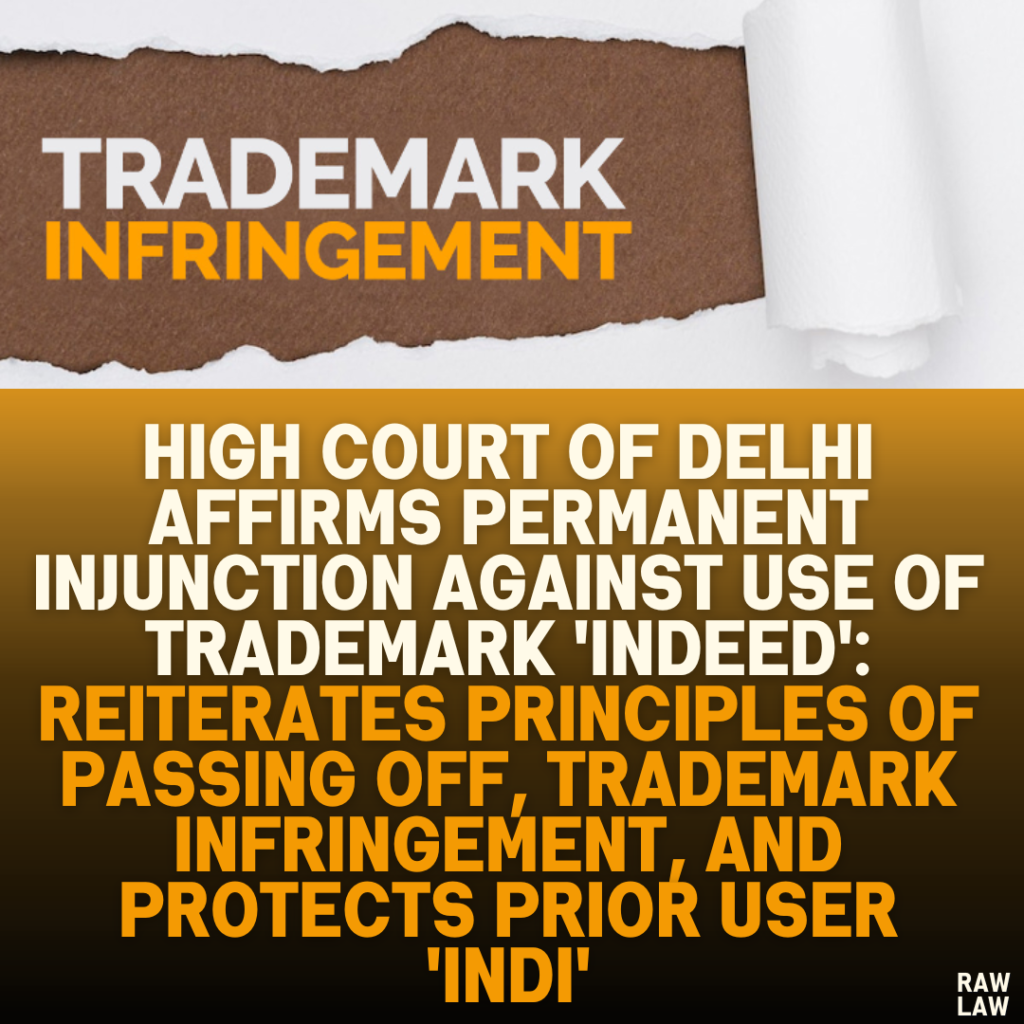Court’s Decision
The High court of Delhi ruled in favor of the plaintiff and made the ex-parte ad interim injunction granted earlier permanent. The defendant was restrained from using the trademark ‘INDEED’ or any similar mark. This decision was based on the finding that the defendant’s actions amounted to both trademark infringement and passing off.
Key highlights:
- The injunction prevents the defendant from using the trademark ‘INDEED’ and any other deceptively similar mark in relation to measuring tapes and related products.
- The defendant’s attempt to sell remaining infringing stock was also rejected.
Facts
- Background of the Plaintiff:
- The plaintiff, a reputed manufacturer of measuring tapes and related tools, has used the trademark ‘INDI’ since 2015.
- The plaintiff has significant market presence, exporting products to over 60 countries, and has established goodwill in the trademark ‘INDI.’
- Introduction of the Defendant:
- The defendant operates in the same industry and launched products under the trademark ‘INDEED’ in July 2024.
- The defendant also adopted a similar ‘blue and white’ trade dress for its products, allegedly to mislead consumers.
- Allegations by the Plaintiff:
- The plaintiff alleged that the mark ‘INDEED’ was phonetically, visually, and structurally similar to its mark ‘INDI.’
- The defendant intentionally adopted an identical trade dress, further compounding the risk of consumer confusion.
- Legal Proceedings:
- The plaintiff obtained an ex-parte ad interim injunction restraining the defendant from using the mark ‘INDEED’ in August 2024.
- The defendant contested this injunction and sought permission to sell existing stock of infringing goods.
Issues
- Trademark Infringement: Does the defendant’s use of the mark ‘INDEED’ infringe the plaintiff’s trademark ‘INDI’?
- Passing Off: Does the defendant’s adoption of a similar mark and trade dress amount to passing off?
- Bona Fide Use: Was the defendant’s adoption of the mark ‘INDEED’ bona fide?
- Relief Sought: Should the defendant be allowed to sell its existing stock bearing the infringing mark?
Petitioner’s Arguments
- Trademark Rights:
- The plaintiff argued that the defendant’s mark ‘INDEED’ was deceptively similar to its mark ‘INDI,’ causing confusion among consumers.
- The plaintiff’s trademark ‘INDI’ has been in use since 2015, establishing goodwill and market reputation.
- Trade Dress:
- While the plaintiff did not claim exclusivity over the ‘blue and white’ color scheme, it highlighted that the defendant’s adoption of this scheme was meant to mislead consumers when combined with the mark ‘INDEED.’
- Market Impact:
- The plaintiff contended that the defendant’s actions caused damage to its goodwill and reputation.
Respondent’s Arguments
- Trademark Ownership:
- The defendant argued that it held trademark registrations for ‘INDEED’ in other classes and had a legitimate right to use it.
- Distinctiveness:
- The defendant claimed that it used ‘INDEED’ alongside its source identifiers, such as ‘SCOTTS,’ to distinguish its products.
- Color Scheme:
- The defendant asserted that the plaintiff could not claim exclusivity over the ‘blue and white’ trade dress.
- Prosecution History:
- The defendant argued that the plaintiff suppressed material facts related to its trademark applications and opposition proceedings.
Analysis of the Law
- Passing Off:
- The court relied on the principles set out in S. Syed Mohideen v. P. Sulochana Bai and Cadila Health Care Ltd. v. Cadila Pharmaceuticals Ltd. to establish the superiority of passing off rights over registration.
- Passing off requires proof of goodwill, misrepresentation, and damage. The court found that all three elements were satisfied in this case.
- Deceptive Similarity:
- Applying the test for deceptive similarity, the court noted that:
- The marks ‘INDI’ and ‘INDEED’ were phonetically and visually similar.
- Both marks were used for identical products, increasing the likelihood of confusion.
- Applying the test for deceptive similarity, the court noted that:
- Trade Dress:
- The adoption of an identical trade dress (blue and white color scheme) compounded the likelihood of confusion and supported the claim of passing off.
Precedent Analysis
- S. Syed Mohideen v. P. Sulochana Bai: Reinforced that passing off rights are superior to registration and focus on the goodwill established by prior use.
- Cadila Health Care Ltd. v. Cadila Pharmaceuticals Ltd.: Established factors for determining deceptive similarity, such as the nature of the marks, goods, and consumers.
- V Guard Industries Ltd. v. Crompton Greaves: Highlighted that sub-brands are not recognized under trademark law, and standalone marks must be evaluated.
Court’s Reasoning
- The court found that the plaintiff established goodwill and prior use of the mark ‘INDI.’
- The defendant’s mark ‘INDEED’ was deceptively similar, and its adoption of the ‘blue and white’ trade dress demonstrated a lack of bona fide intent.
- The defendant failed to provide a convincing explanation for adopting the mark ‘INDEED.’
Conclusion
The court:
- Made the ex-parte ad interim injunction permanent, restraining the defendant from using the mark ‘INDEED.’
- Dismissed the defendant’s plea to sell existing infringing stock.
- Clarified that the observations were limited to the interim stage and would not affect the final adjudication of the suit.
Implications
- The judgment reinforces the principle that prior user rights and goodwill are paramount in passing off actions.
- It underscores the importance of consumer protection and curbing deceptive practices in the market.
- The ruling serves as a reminder to businesses to exercise caution in adopting trademarks to avoid infringing on existing rights.
